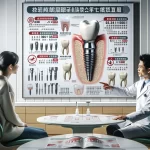Dental crowns are a widely used restorative solution for damaged teeth, offering both functional and aesthetic benefits. However, like any medical procedure, they come with their own set of potential drawbacks. This comprehensive guide delves into the disadvantages of dental crowns, helping you make an informed decision about your oral health.
What Are Dental Crowns?
Dental crowns are custom-made caps that completely cover damaged or decayed teeth, restoring their shape, size, strength, and appearance. These versatile restorations serve multiple purposes in dentistry, addressing various dental issues and improving both function and aesthetics.

Types of Dental Crowns
Several types of dental crowns are available, each with unique characteristics:
Porcelain Crowns: Offering excellent aesthetics, porcelain crowns are ideal for visible teeth, especially in the anterior region. They closely match the color and clarity of natural teeth, providing a seamless appearance. However, porcelain crowns are more prone to chipping or breaking compared to other materials.
Metal Crowns: Known for their exceptional durability, metal crowns (particularly gold crowns) can last 15-20 years or more with proper care. They require minimal tooth reduction and are extremely resistant to wear. Their metallic appearance makes them less popular for visible teeth, but they remain an excellent choice for out-of-sight molars.
Porcelain-Fused-to-Metal (PFM) Crowns: PFM crowns combine the strength of metal with the aesthetics of porcelain, offering a good balance between durability and appearance. They may show a dark line at the gum edge over time, which can be aesthetically displeasing.
Zirconia Crowns: Gaining popularity due to their high strength, toughness, and biocompatibility, zirconia crowns offer excellent aesthetics and are suitable for both anterior and posterior restorations. They have shown superior fracture resistance and marginal adaptation compared to metal crowns, especially for anterior teeth.
Lithium Disilicate Crowns: A popular choice for single-unit crowns, particularly in the anterior region, lithium disilicate offers good aesthetics and can be bonded to tooth structure, providing additional strength.
Advantages and Considerations
When selecting a dental crown material, several factors should be considered:
Aesthetics: For front teeth and visible areas, all-ceramic, porcelain, or lithium disilicate crowns are excellent options due to their natural appearance. Zirconia crowns also offer good aesthetics while providing superior strength.
Durability: For posterior teeth or areas subject to heavy biting forces, zirconia or metal crowns are recommended due to their exceptional strength and durability. PFM crowns can also be durable, but the porcelain portion may chip under heavy stress.
Cost: While resin crowns are generally more cost-effective, they may wear down more quickly and are prone to staining. Metal and zirconia crowns, while more expensive, offer superior longevity, with some lasting up to 15-20 years or more.
Tooth Preservation: Some crown materials, like resin, require less removal of natural tooth structure, which can be beneficial for long-term tooth health.
The choice of dental crown material depends on various factors, including the tooth’s location, aesthetic requirements, bite forces, and patient preferences. Consulting with a dentist is crucial to determine the most suitable option for each individual case. With proper care and maintenance, dental crowns can provide long-lasting restoration and improve both the function and appearance of teeth.
Key Disadvantages of Dental Crowns
Dental crowns are a popular restorative option, but it’s crucial to understand their potential drawbacks. Here’s a comprehensive look at the key disadvantages to consider:
Irreversible Tooth Alteration
The process of preparing a tooth for a crown involves significant enamel removal, leading to permanent changes in the tooth structure. This alteration means:
- The natural tooth structure cannot be restored once modified
- The tooth will always require some form of protection after preparation
For example, a typical crown preparation removes about 1-2 mm of tooth structure from all surfaces, which is approximately 63-76% of the tooth’s crown.
Sensitivity and Discomfort
Many patients experience sensitivity or discomfort following crown placement. Common issues include:
- Increased sensitivity to hot and cold temperatures
- Discomfort while biting or chewing
- Potential pain from nerve irritation
A study published in the Journal of Prosthetic Dentistry found that approximately 18% of patients report post-crown sensitivity lasting more than six months. This prolonged sensitivity can significantly impact daily life, affecting eating habits and overall comfort.
Risk of Nerve Damage or Infection
The crown preparation process can lead to serious complications:
- Accidental nerve damage during enamel removal
- Increased risk of infection if bacteria enter the tooth
- Potential need for root canal treatment in some cases
For instance, if the tooth’s pulp becomes irritated during the crown preparation or placement, it may lead to pulpitis, requiring root canal therapy in about 5-7% of cases.
Bite Issues and Jaw Pain
Poorly fitted crowns can result in several problems:
- Misalignment with surrounding teeth
- Uneven bite pressure leading to discomfort
- Temporomandibular joint (TMJ) issues
These issues can cause chronic pain and may require additional dental work to correct. In some cases, patients may need to undergo bite adjustment procedures or even have the crown replaced to resolve persistent problems.
Aesthetic Concerns
Although crowns aim to mimic natural teeth, aesthetic issues can arise:
- Color mismatches with surrounding teeth
- Visible crown margins where the crown meets the tooth
- Difficulty achieving a natural appearance, particularly for front teeth
Advancements in dental materials have improved aesthetic outcomes, but challenges remain, especially with metal-based crowns that may show a dark line at the gum.
Cost and Longevity Considerations
Understanding the financial aspects of dental crowns is crucial:
| Factor | Details |
|---|---|
| Initial Cost | $800 – $1,500 per crown (average in the US as of 2025) |
| Lifespan | Typically ranges from 5 to 15 years depending on material and care |
| Replacement Needs | May require multiple replacements over a lifetime |
| Insurance Coverage | Often limited; may not cover full costs or replacements |
The long-term costs associated with dental crowns can be significant, especially considering potential replacements and associated procedures.
Potential for Crown Failure
A recent study found that zirconia crowns have a cumulative failure rate of approximately 28.33% over 15 years due to issues such as:
- Veneer fractures
- Loss of retention
- Secondary decay under the crown
These failures can lead to additional dental work, increased costs, and potential complications for the underlying tooth structure.
Managing Risks and Complications of Dental Crowns
Choosing the Right Dental Professional
Selecting an experienced dentist is crucial for minimizing risks associated with dental crown procedures. Look for a professional with a strong track record in crown procedures and positive patient reviews. The American Dental Association provides a dentist finder tool to help locate qualified professionals in your area.
Post-Procedure Care
Adhering to your dentist’s post-procedure instructions is vital for proper healing and reducing the risk of complications. This may include:
- Avoiding hard or sticky foods for the first 24-48 hours
- Being gentle when brushing around the crown
- Using desensitizing toothpaste if recommended by your dentist
The American Association of Endodontists offers detailed guidelines for post-procedure care that can help ensure a smooth recovery.
Maintaining Excellent Oral Hygiene
Good oral hygiene is essential for preventing complications and extending the life of your dental crown. The American Dental Association recommends:
- Brushing twice daily with a soft-bristled toothbrush
- Flossing daily, paying special attention to the area around the crown
- Using an antimicrobial mouthwash to reduce bacteria
For more comprehensive oral care tips, visit the ADA’s Oral Health resource page.
Regular Dental Check-Ups
Attending routine dental visits allows your dentist to monitor the condition of your crown and overall oral health. These check-ups can help detect and address potential issues early. The Centers for Disease Control and Prevention (CDC) provides guidelines on oral health that emphasize the importance of regular dental visits.
Avoiding Damaging Habits
To protect your crown and overall oral health:
- Avoid grinding your teeth (consider a night guard if you’re prone to bruxism)
- Don’t chew on hard objects like ice or pens
- Limit consumption of staining substances like coffee and red wine
The National Institute of Dental and Craniofacial Research offers additional tips for maintaining good oral health and protecting dental work.
Recognizing Signs of a Failing Crown
Be alert for these warning signs that may indicate a problem with your dental crown:
- Pain or Sensitivity: Persistent discomfort or sensitivity to hot and cold
- Visible Damage: Chips, cracks, or other visible signs of wear
- Looseness: Any movement or wobbling of the crown
- Bite Changes: Alterations in how your teeth align when you close your mouth
- Gum Issues: Recession or inflammation of the gums around the crown
If you notice any of these signs, contact your dentist promptly for an evaluation. The American Dental Association provides a symptom checker to help identify potential dental issues.
Long-Term Care and Maintenance
To prolong the life of your dental crown:
Brush twice daily using a soft-bristled toothbrush.
Floss daily, paying extra attention around the crown area.
Use an antibacterial mouthwash to reduce plaque buildup.
Wear a night guard if you grind your teeth at night.
Avoid biting on hard foods or objects that could damage the crown.
Making an Informed Decision
When considering dental crowns, weigh these factors carefully:
Severity of Tooth Damage: Assess how damaged your tooth is and whether a crown is necessary.
Alternative Treatment Options: Explore other options like veneers or bonding that might be less invasive.
Long-Term Oral Health Goals: Consider how this treatment fits into your overall dental health plan.
Financial Considerations: Evaluate whether you can afford the upfront costs and potential future replacements.
Aesthetic Preferences: Think about how important appearance is for the specific tooth being treated.
Questions to Ask Your Dentist
Before proceeding with treatment, consider asking these questions:
- Is a crown absolutely necessary for my situation?
- What type of crown material do you recommend based on my needs?
- How many crown procedures have you performed?
- What steps can I take to minimize potential complications?
Conclusion
While dental crowns offer significant benefits for restoring damaged teeth, it’s crucial to understand their potential drawbacks thoroughly. By being aware of these disadvantages and taking proactive steps in your dental care routine, you can make informed decisions that align with your health goals.
Good oral hygiene practices and regular dental check-ups are essential for maintaining both your natural teeth and any dental restorations like crowns.
Frequently Asked Questions
What is the average lifespan of a dental crown?
- The lifespan varies by material; metal crowns can last 20–30 years while porcelain or ceramic crowns typically last 10–15 years.
Can dental crowns lead to tooth sensitivity?
- Yes, some patients may experience increased sensitivity after getting a crown, especially if it is not properly fitted.
Are there risks associated with fitting dental crowns?
- Yes, reshaping the natural tooth can weaken it and expose sensitive dentin; improperly fitted crowns can cause discomfort.
How does the cost of a dental crown vary?
- Costs depend on material choice (gold vs porcelain) and location; additional costs may include preparatory work.
What should I do if my dental crown doesn’t feel right?
- Consult your dentist immediately if you experience discomfort or bite issues; adjustments may be necessary.







